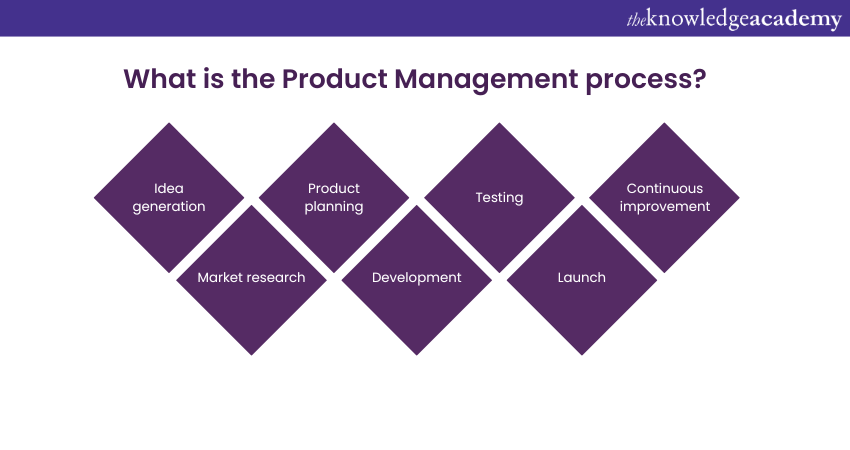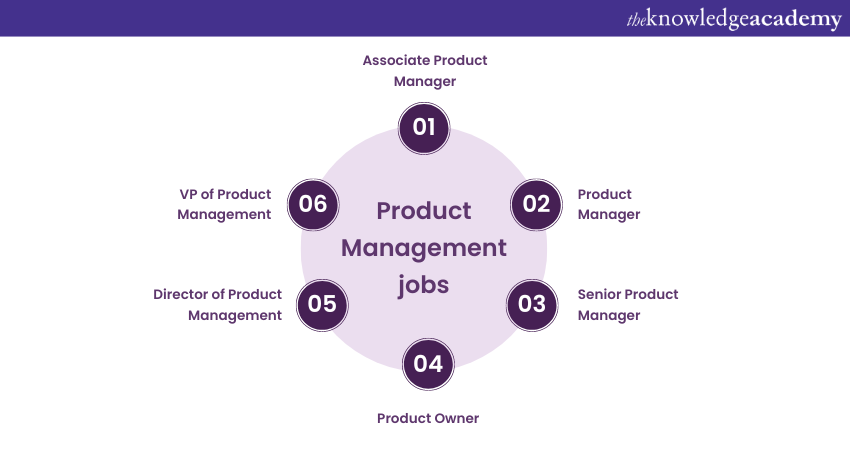We may not have the course you’re looking for. If you enquire or give us a call on +49 8000101090 and speak to our training experts, we may still be able to help with your training requirements.
Training Outcomes Within Your Budget!
We ensure quality, budget-alignment, and timely delivery by our expert instructors.

Product Management is the driving force that turns a good idea into everyone’s favourite product. It’s all about being the brain behind the scenes, figuring out what people love and how to give it to them. Think of a Product Manager as the mastermind behind a thrilling adventure, ensuring every feature captivates the customer. They are the ones who spot the trends and bring them to life. Product Management is more than just overseeing—it’s about sparking excitement and delivering joy through products that fit seamlessly into our lives. It’s the craft of turning ‘What is Product Management?’ into ‘Wow, that’s brilliant!’ This blog covers the various tools and processes in Product Management. Read on to learn more.
Table of Contents
1) Understanding What is Product Management?
2) Who is a Product Manager?
3) What is the Product Management process?
4) Product Management tools
5) Product Management jobs
6) Conclusion
Understanding What is Product Management?
Product Management refers to the process of leading a product from the conception stage to the market, even after getting into the market. It covers identifying customer requirements, strategising how to create something that will meet these needs, and coordinating with other teams. It aims to develop a final product that aligns with the market's needs. Its stages include market analysis, product conception, design, trials, and release into the market. Another aspect is also continuity since the product requires constant refinement to meet the market demands. Effective Product Management ensures that a product not only meets customer expectations but also achieves business objectives.
Who is a Product Manager?
A Product Manager is a professional responsible for guiding the development and success of a product. They work with various teams to ensure the product meets customer needs, aligns with business goals, and is delivered on time. They also analyse market trends and user feedback to make continuous improvements.
What is the Product Management process?
The Product Management process involves a series of steps to guide a product from idea to launch and beyond. These steps include:

a) Idea generation: This step involves brainstorming and collecting ideas for new products or improvements to existing ones. It is based on market needs, technological advancements, or customer feedback. The goal is to gather a variety of ideas to explore further.
b) Market research: This involves analysing market trends, competitor products, and customer needs. The goal is to identify opportunities and validate the potential success of the product idea. It helps ensure the product will meet market demands.
c) Product planning: In this step, the product vision is defined, and a roadmap is created. This includes outlining the product's features, target audience, and business goals. It ensures the product aligns with the company's overall strategy.
d) Development: This step includes collaborating with engineering and design teams to build the product. It follows the specifications and requirements outlined during the planning phase. The goal is to turn the product concept into a tangible product.
e) Testing: Thorough testing is conducted to identify and fix any issues or bugs. This step ensures the product meets quality standards and functions as intended. It helps catch problems before the product is launched.
f) Launch: The product is introduced to the market through coordinated marketing and sales efforts. Monitoring its initial performance is crucial to make any necessary adjustments. The aim is to ensure a successful market entry.
g) Continuous improvement: Customer feedback and market data are gathered and analysed. This allows for ongoing enhancements and updates to the product. The aim is to keep the product competitive and aligned with evolving customer needs.
Learn to conduct market research and customer analysis with our Product Management Training – join today!
Product Management tools
Product Management Tools help streamline various aspects of the process, enhancing efficiency and collaboration. Here are some essential tools used in Product Management:

a) Roadmapping tools: Software like Aha! and ProductPlan helps create and share product roadmaps. This aligns teams and stakeholders on the product strategy and timeline.
b) Project Management tools: Tools like Jira and Trello assist in planning and tracking product development tasks. They ensure timely delivery and efficient workflow.
c) Collaboration tools: Platforms such as Slack and Microsoft Teams facilitate communication among teams. They keep everyone connected and informed.
d) Analytics tools: Solutions like Google Analytics and Mixpanel provide insights into user behavior and product performance. They help Product Managers make data-driven decisions.
e) Prototyping tools: Tools like Figma and InVision allow for the creation of interactive prototypes and wireframes. This enables early testing and feedback on product design.
f) Customer feedback tools: Software such as SurveyMonkey and UserVoice collects and analyses customer feedback. This guides product improvements to meet customer needs.
g) Documentation tools: Tools like Confluence and Notion help organise and share product documentation. This ensures all team members have access to essential information.
Product Management jobs
Product Management jobs are highly sought after in today's competitive market. These roles involve the development and success of products, ensuring they meet customer needs and business goals. Here are some common job titles in Product Management:

a) Associate Product Manager: They support the Product Manager in various tasks. This position is often entry-level and provides a pathway to becoming a full Product Manager. They help with research, planning, and coordination. It's a great role to play in learning the basics of Product Management.
b) Product Manager: A Product Manager checks the entire lifecycle of a product, from the initial idea to its launch and ongoing improvements. They work closely with various teams to ensure the product meets market demands. Their role involves a mix of strategy, planning, and execution. They aim to create products that solve real customer problems.
c) Senior Product Manager: The Manager handles more complex products or multiple product lines. They have more strategic responsibilities and often mentor Junior Product Managers. Their role requires extensive experience and a deep understanding of the market. They play a key role in driving the company's product strategy.
d) Product Owner: They focus on the day-to-day development process of a product. They work closely with engineering teams to ensure the product is built correctly. Their main job is to manage the product backlog and prioritise features. They ensure the development team is aligned with the product vision.
e) Director of Product Management: They lead a team of Product Managers. They set the overall product strategy and ensure it aligns with the company’s goals. They also handle high-level planning and coordination. This role requires strong leadership and strategic thinking skills.
f) VP of Product Management: The Vice President of Product Management monitors the entire Product Management department. They align the product strategy with the overall business objectives. This role involves high-level decision-making and coordination across departments. They are responsible for the success of all product lines.
g) Chief Product Officer (CPO): The CPO is the top executive responsible for all product-related activities in the organisation. They set the vision and direction for the company's product portfolio. This role involves working closely with other executives to drive the company's growth. The CPO ensures that all products align with the company’s long-term goals.
Conclusion
Understanding "What is Product Management?" is crucial to transforming great ideas into successful products. A savvy Product Manager juggles inventiveness, tactical planning, and teamwork to make sure every part of the product fits the company’s aims and what customers want. Get the hang of the nifty tricks and steps of Product Management, and you’ll whip up products that do more than just satisfy needs—they’ll make your users super happy!
Understand the supply chain structure and its distribution process with our Supply Chain Management Training – join today!
Frequently Asked Questions

Cross-functional collaboration is vital in Product Management as it involves working with engineering, marketing, sales, and support teams. Effective collaboration ensures the product meets all technical, market, and user requirements.

User feedback provides direct insights into how customers perceive and use the product. This feedback helps make necessary improvements and ensures the product remains relevant and valuable.

The Knowledge Academy takes global learning to new heights, offering over 30,000 online courses across 490+ locations in 220 countries. This expansive reach ensures accessibility and convenience for learners worldwide.
Alongside our diverse Online Course Catalogue, encompassing 17 major categories, we go the extra mile by providing a plethora of free educational Online Resources like News updates, Blogs, videos, webinars, and interview questions. Tailoring learning experiences further, professionals can maximise value with customisable Course Bundles of TKA.

The Knowledge Academy’s Knowledge Pass, a prepaid voucher, adds another layer of flexibility, allowing course bookings over a 12-month period. Join us on a journey where education knows no bounds.

The Knowledge Academy offers various Industry Training, including Product Management Training, Supply Chain Management Training, and Logistics Management Training. These courses cater to different skill levels, providing comprehensive insights into Product Management Metrics.
Our Business Skills Blogs cover a range of topics related to Product Management, offering valuable resources, best practices, and industry insights. Whether you are a beginner or looking to advance your Product Management skills, The Knowledge Academy's diverse courses and informative blogs have got you covered.
Upcoming Business Skills Resources Batches & Dates
Date
 Product Management Training
Product Management Training
Fri 27th Dec 2024
Fri 21st Feb 2025
Fri 25th Apr 2025
Fri 20th Jun 2025
Fri 29th Aug 2025
Fri 31st Oct 2025
Fri 19th Dec 2025







 Top Rated Course
Top Rated Course



 If you wish to make any changes to your course, please
If you wish to make any changes to your course, please


